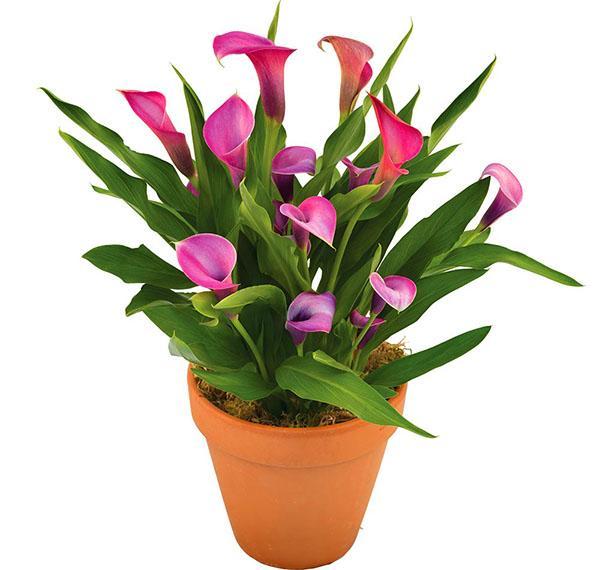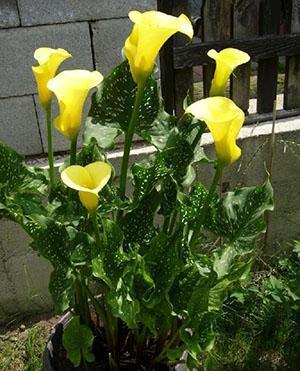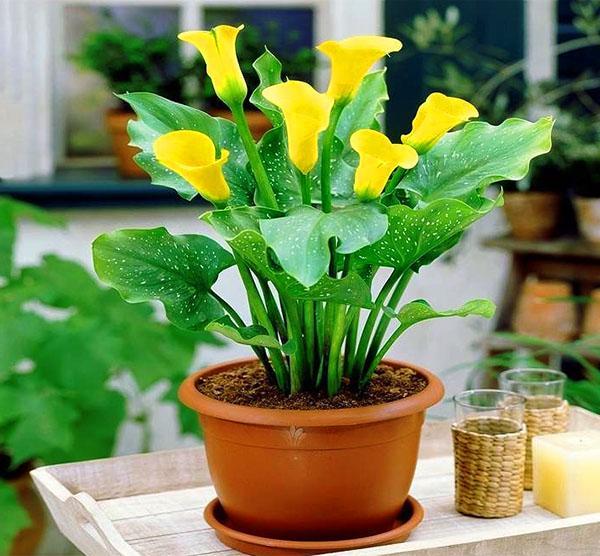What home care does zantedeschia require?
 Zantedeschia, better known as calla lilies, is grown as an indoor and greenhouse flower. Home care for zantedeskia is not very difficult. However, when placing a plant from the aroid family on the windowsill, you must take precautions - the plant is poisonous. The beauty of a calla is in its flower. The ear, protected by a beautiful blanket, is the main advantage of the plant. The bract is bright, but after pollination of the cob, it turns pale and provides additional nutrition to the seeds.
Zantedeschia, better known as calla lilies, is grown as an indoor and greenhouse flower. Home care for zantedeskia is not very difficult. However, when placing a plant from the aroid family on the windowsill, you must take precautions - the plant is poisonous. The beauty of a calla is in its flower. The ear, protected by a beautiful blanket, is the main advantage of the plant. The bract is bright, but after pollination of the cob, it turns pale and provides additional nutrition to the seeds.
Calla lilies requirements for room maintenance

Ethiopian Zantedeskia feels better than other varieties on the windowsill. The flower-ear is covered with a long bracts. This species blooms at the end of winter, and pleases with its beauty for more than a month.
If seed breeding is not planned in the care of calla lilies, after flowering, the arrow must be cut off with a sharp knife. This saves the strength of the plant for seed formation.
Read also about loosestrife monkey!
Features of agricultural technology of the Ethiopian calla lily
 The dormant period begins immediately after flowering. Therefore, it is necessary to maintain a temperature of 18-20 degrees. Below 160 The flower can get sick. During the dormant period, watering is performed only to maintain the remaining moisture in the soil for 1.5 - 2 months. At this time, part of the leaves dries out. But it is important to prepare the plant for dormancy gradually, reducing the intake of moisture, and they also bring the flower out of hibernation.
The dormant period begins immediately after flowering. Therefore, it is necessary to maintain a temperature of 18-20 degrees. Below 160 The flower can get sick. During the dormant period, watering is performed only to maintain the remaining moisture in the soil for 1.5 - 2 months. At this time, part of the leaves dries out. But it is important to prepare the plant for dormancy gradually, reducing the intake of moisture, and they also bring the flower out of hibernation.
Abundant watering in the care of the zantedesk is required only during flowering. Watered with soft water after settling. Excessive moisture can destroy the fleshy root.
Moist air will help keep the calla lily leaves beautiful. Therefore, they are sprayed, bathed in the shower. A humidifier, a tray with pebbles and moss, an aquarium will delight the plant.
An important technique in caring for a zantedesque at home is the annual planting of tubers in a new substrate. For early flowering at the end of summer, the tubers are transplanted into fresh soil without deepening the neck. At the same time, small tubers are separated for reproduction.
 The nodules are cut with a sterilized knife, dried and planted each in a separate glass.
The nodules are cut with a sterilized knife, dried and planted each in a separate glass.
In indoor maintenance, zantedeschia requires a spacious pot. In a cramped dish, calla lilies cannot be expected to bloom. During the season, the land is depleted and its fertility cannot be restored with fertilizers.
When replanting, a standard soil for flowering plants is used. You can mix it up using:
- fertile turf from under wheatgrass - 2 parts;
- humus - 1 part;
- peat - 1 part;
- calcined river sand - 1 part;
- leafy ground - 1 part.
Zantedeschia grows approximately on such soil in the natural environment. It is possible to grow a flower in hydroponics. Fertilizer mixtures should contain a lot phosphorus and little nitrogen. Then calla lilies bloom profusely.
Zantedeskia care mistakes at home and the consequences
 The choice of a spacious container for a flower is a determining factor for creating a powerful bush and numerous flower stalks. But the decorative effect of the bush is no less affected:
The choice of a spacious container for a flower is a determining factor for creating a powerful bush and numerous flower stalks. But the decorative effect of the bush is no less affected:
- the level of illumination of the plant during the growing season;
- temperature conditions;
- the predominance of the nitrogen component in fertilization.
Beautiful leaves will begin to dry out if the plant is in a draft or is not moistened. In addition, the scourge of indoor plants - spider mites - will start in dry air.
The plant can be attacked by aphids, whiteflies. If the soap solution does not help, you will have to repeatedly apply insecticides to clean the flower.